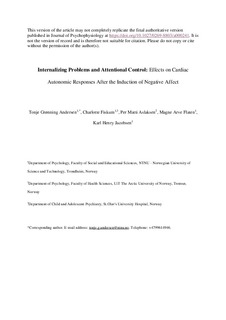Internalizing problems and attentional control: Effects on cardiac autonomic responses after the induction of negative affect
Andersen, Tonje Grønning; Fiskum, Charlotte; Aslaksen, Per M; Flaten, Magne Arve; Jacobsen, Karl Henry
Journal article, Peer reviewed
Accepted version

View/
Date
2019Metadata
Show full item recordCollections
- Institutt for psykologi [3080]
- Publikasjoner fra CRIStin - NTNU [38047]
- Publikasjoner fra Cristin - St. Olavs hospital [1530]
- St. Olavs hospital [2503]
Original version
10.1027/0269-8803/a000241Abstract
Abstract. Individuals with internalizing problems differ in levels of attentional control (AC), and this heterogeneity could be associated with differences in autonomic arousal. The present study investigated whether AC moderated the effect of internalizing problems on self-reported experience and autonomic nervous system (ANS) responses after the induction of negative affect. Children aged 9–13 years were recruited into a patient group (29) and a healthy control group (25). AC was measured by the Early Adolescent Temperament Questionnaire. Heart rate, heart rate variability (HRV) and pre-ejection period (PEP) were recorded during baseline, a sad film clip and recovery, and analyzed using a marginal linear model. Children reported their experienced emotion, valence, and arousal in response to the film. A significant interaction effect showed increased HRV and longer PEP from baseline to recovery for patients with higher AC. Patients with lower AC showed increased HRV followed by a return to baseline values after the film clip and no significant changes in PEP. Healthy controls showed no significant changes in HRV or PEP independent of level of AC. There were no differences between groups in self-reported experience. The results indicate that AC moderated the effect of internalizing problems on ANS regulation. Increased HRV and longer PEP from baseline to recovery were uniquely associated with higher AC and internalizing problems. This physiological response might indicate a cognitive avoidance strategy. AC could be an important factor explaining heterogeneity in ANS activity among individuals with internalizing problems. Clinical implications of the present findings are discussed.